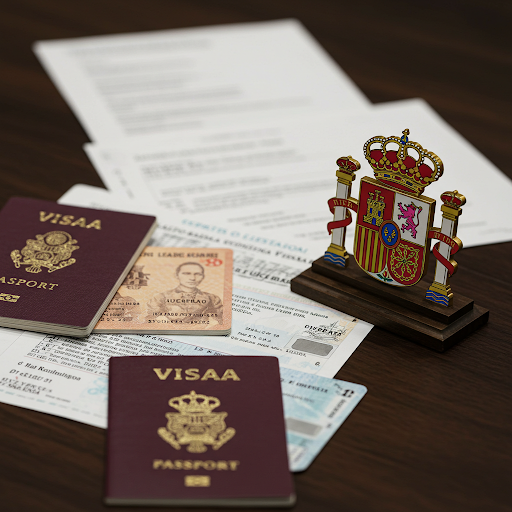To qualify in 2025, you’ll need to meet the Spain Digital Nomad Visa Requirements, which generally include the following criteria:
Spain Digital Nomad Visa Requirements
1. Proof of Remote Employment or Self-Employment:
- Employed Individuals: You must demonstrate that you are employed by a company located outside of Spain and that your employer allows you to work remotely from Spain. This typically requires a work contract of at least three months duration and a letter from your employer confirming your remote work arrangement and that the company has been active for at least one year.
- Freelancers: You need to prove that you have ongoing contracts with clients outside of Spain. Long-term contracts are usually required. Importantly, as a freelancer, you can earn up to 20% of your income from Spanish clients. Your professional activity or your company must have existed for at least one year.
2. Proof of Sufficient Financial Means:
- You must demonstrate a minimum monthly income of €2,762.66 (200% of the Spanish Minimum Inter-professional Salary (SMI) for 2025, which is €1,184 per month). This threshold might be updated, so it’s crucial to verify the current SMI.
- Additional amounts are required for family members:
- First additional family member: €1,035 per month (75% of SMI).
- Each subsequent family member: €346 per month (25% of SMI).
- You will need to provide bank statements, pay slips, or employment contracts to prove your income.
3. Valid Health Insurance:
- You must have private health insurance coverage from a Spanish provider that covers all risks typically covered by the Spanish public health system, without co-payments or waiting periods. This insurance must cover you and any accompanying family members for the entire duration of your stay.
4. Clean Criminal Record:
- You need to provide a criminal record certificate from all countries where you have resided in the past five years. This certificate must be officially translated into Spanish and apostilled (or legalized, depending on the country of origin). You will also likely need to provide a sworn declaration stating you have no criminal record for the last five years.
5. Qualifications or Experience:
- You must provide proof of either:
- A university degree, postgraduate degree, or professional certificate from a recognized institution.
- At least three years of professional work experience in your current field.
6. Passport and Other Documents:
- A valid passport with at least one year of validity remaining and two blank pages. Passports issued more than 10 years ago may not be accepted.
- Passport-sized photographs.
- A completed national visa application form.
- Proof of having a registered address in Spain. Initially, a hotel booking might suffice for the visa application, but you will need a more permanent address to obtain the residency permit.
- Payment of the applicable visa fees (around €80-€90 for the initial visa application at the consulate). Fees for the residency application in Spain may also apply (around €73 for a three-year permit and €16.8 for the residence card).
7. Not Having Resided Illegally in Spain:
- You must not have lived illegally in Spain previously or within the last five years.
8. Minimum Residency Requirement for Renewal:
- While there is no minimum stay requirement for the initial visa, to renew your Digital Nomad residency permit, you will generally need to have resided in Spain for at least six months within the preceding 12-month period.
Application Process (General Steps):
- Gather Required Documents: Ensure you have all the necessary documentation, properly translated and legalized/apostilled.
- Apply for the Visa: You can typically apply for the Digital Nomad Visa at the Spanish consulate in your country of residence. You will need to schedule an appointment and submit your application along with the required documents and fees.
- Receive Your Visa: If your application is approved, you will receive a visa valid for one year.
- Apply for the TIE (Tarjeta de Identidad de Extranjero): Within 90 days of your arrival in Spain, you must apply for your Foreigner Identity Card (TIE) at the relevant immigration office in Spain. This involves providing your visa, passport, proof of address in Spain, and other documents, as well as undergoing fingerprinting. You will also likely need to obtain an NIE (Número de Identificación de Extranjero) if you don’t already have one.
Important Considerations:
- The information provided is a general overview, and specific requirements and procedures can vary depending on your country of origin and the specific Spanish consulate or immigration office.
- It is highly recommended to consult the official website of the Spanish Ministry of Foreign Affairs, the Spanish embassy or consulate in your country, or seek advice from an immigration lawyer specializing in Spanish visas for the most up-to-date and personalized information.
- The Spanish Digital Nomad Visa can initially grant you a stay of 12 months, and it is renewable for up to five years. After five years of legal residency, you may be eligible to apply for permanent residency.
As part of understanding the Spain Digital Nomad Visa Requirements, it’s highly recommended to consult a tax advisor who specializes in international taxation in Spain. They can help you clearly understand your specific tax obligations, identify any available benefits, and navigate potential double taxation issues based on treaties between Spain and your home country.


Leave a Reply